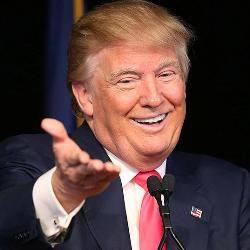Trump Presidency May Be Good For iPoker

The U.S. presidential election was a major upset, and one that even the bookmakers failed to predict. Ahead of Trump being sworn in as America’s 45th president on January 20th of 2017, everyone is wondering exactly what the billionaire businessman will do while serving in Office. No matter whom you voted for back in November, however, if you’re an online gambling enthusiast there is some evidence to suggest that a Trump presidency may actually be good for the industry.
A History with Online Gambling
In 2011, Donald Trump entered into a partnership arrangement with hedge fund manager Marc Lasry in order to begin running an online gambling company. The two men were hoping that federal online gambling legislation was about to rise from the ashes of Black Friday, but unfortunately that legislation never happened, and the project was subsequently abandoned. Still, many people think that Trump’s previous interest in online poker may indicate that he would still be amenable to its legalization today.
A New Political Climate
Donald Trump managed to win the presidency by appealing to and spurring into action a previously ignored and underrepresented segment of the population, namely blue collar workers with a high school diploma and no college education. In the past, this demographic has been shown to be passionate about online gaming, and while Trump might not be able to make good on all of the promises that got him elected, he could push for online gaming in order to help keep his base of supporters happy, especially if they start to speak out en masse in favor of legalization.
Following the result of the 2016 election, it’s clear that the religious right no longer has a foothold on the Republican Party. While many evangelicals did lend support to Trump, others opposed him because of his outlandish comments and lack of any real religious base. But even without them, Trump managed to get elected, indicating that Republican lawmakers may no longer be beholden to the whims of the religious right. This is good news for online gambling, as it’s this segment of the Republican Party that often speaks out against iGaming legislation due to moral and social objections to gambling.
But Not So Fast
While there are some indications that Donald Trump might not oppose nationwide online poker legislation, there are also some signs that he might stand in its way. Trump is known to be in league with Sheldon Adelson, the Las Vegas Sands Corporation president who is staunchly against online gambling and online poker. In fact, he has made it his mission to lobby both state and federal lawmakers to make sure his voice is heard, and its possible that Adelson’s voice could prove to be the loudest one in Trump’s ear. Of course, it’s equally possible that Trump will go his own way, as the billionaire hardly needs to worry about the financial implications of alienating Adelson.
Furthermore, not only is Adelson’s stance on the issue considered hypocritical and motivated by self-interest by many industry professionals and politicians, but there is also mounting evidence to suggest his opinion that online poker was as addictive as “crack cocaine” is far off the mark. A recent study conducted by the University of Oxford’s Internet Institute, for instance, concluded that the rate of gambling addiction amongst those playing on the internet was actually very low, and in a blow to Adelson’s argument, Rep. Bonnie Watson Coleman commented earlier this year:
“The evidence clearly demonstrates that with proper regulation, in-state online gambling poses no more challenges to law enforcement or risk to consumers than brick and mortar casinos.”
Wait and See
As with everything following the historic election of 2016, the future of online gambling under a Trump presidency is unclear. Donald Trump has flip-flopped on issues in the past, leaving a big question mark hovering over how his presidency might impact the USA’s online gambling industry. Nevertheless, the signs are still good that Trump will allow individual states to follow their own paths on the issue, and as it states on the constitutional rights website:
“He will defend Americans’ fundamental rights to free speech, religious liberty, keeping and bearing arms, and all other rights guaranteed to them in the Bill of Rights and other constitutional provisions. This includes the Tenth Amendment guarantee that many areas of governance are left to the people and the States, and are not the role of the federal government to fulfill.”









